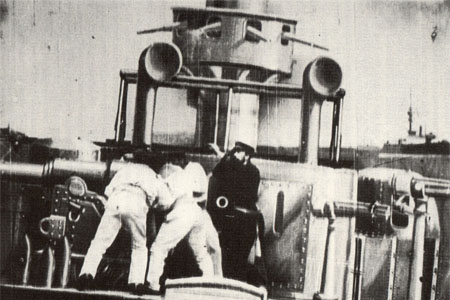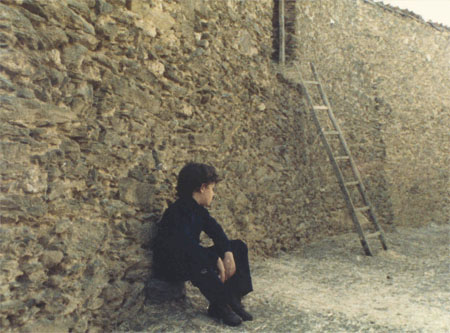“The latest addition to the Bioscope Library is a dissertation whose publication online is the most considerable, and perhaps the most significant, work yet from one of most important—though overlooked—writers on early cinema,” writes Luke McKernan. “Dr Stephen Bottomore’s dissertation Filming, faking and propaganda: The origins of the war film, 1897-1902 (2007) has been published online as a PDF by the University of Utrecht…. Bottomore references Paul Virilo’s argument, in War and Cinema: The Logistics of Perception, that the evolution of war over the twentieth century has been bound up with a change in human perception, itself profoundly linked to developments in photographic and cinematic technique. How war is seen impacts on what war is.”
More reading. Henry M. Taylor in the current issue of Cineaction: “The Junkies of Plato’s Cave: Inception, Mindbending, and Complex Narration in the Shadow of Philip K. Dick.”
DVD. In Slant, Calum Marsh reviews Jean-Luc Godard‘s Ici et Ailleurs (1976), out now from Olive Films (as noted the other day), and “a radical, acerbic, and completely remarkable work of deconstructive self-criticism, and if it’s not remembered as a great film, if it’s indeed remembered at all, it should still stand, for Godard, as an important first step away from propagandistic abstraction and toward a recalibrated, newly reenergized approach to filmmaking. If the perception remains that Godard’s career ‘got back on track’ with the release of Sauve Qui Peut (La Vie) in 1980, rest assured that Ici et Ailleurs is, perhaps more than any other, the film that got him there. Whether it’s recognized as such or not, Ici et Ailleurs is the first film to signal the reemergence of one of the cinema’s major talents, and it should be cherished as such.”
In other news. “Walking around the opening party you couldn’t help but hear the word ‘rebirth’ a lot.” Hope Dickson Leach files a dispatch from the Edinburgh International Film Festival to Filmmaker.
New York. Ana (1982) screens tonight as part of the Anthology Film Archives series The School of Reis: The Films and Legacy of António Reis and Margarida Cordeiro. Aaron Cutler: “Many recent members of the Portuguese school (which includes Pedro Costa, Marcelo Felix, Miguel Gomes, João Pedro Rodrigues, and Gonçalo Tocha, among others) studied under António Reis… Like Reis and Cordeiro’s Trás-os-Montes (1976), which travels through villages in Cordeiro’s home region, the film is a record of a beautiful place most viewers will have never seen before; like their Jaime (1974), which records the words, places, and curved, spiral-filled figures of a mental patient’s sketches, it suggests how some of the most beautiful spaces are created inside the mind.”
Also in the L: “In Roberto Rossellini’s post-WWII black comedy The Machine That Kills Bad People, the camera becomes a fully operational merchant of death, weaponized in the name of social justice,” writes Glenn Heath Jr. Machine screens tomorrow as part of BAMcinemaFest.
San Francisco. Brian Darr rounds up local goings on at Hell on Frisco Bay.
London. “Kaneto Shindo, who died last month aged 100, just before the start of a two month British Film Institute season dedicated to his career and that of long-term collaborator Yoshimura Kozaburo, spent a lot of time among the reeds, wading through mud, puddles and into woods of bamboo.” Emilie Bickerton for the Guardian: “He was most comfortable there, where life was reduced to its bare essentials. Shindo was born in 1912 in Hiroshima. Japan modernized dramatically over his lifetime, but he observed it at a distance, with the knowledge that all this could disappear drummed into him from childhood after what had happened to his hometown. His subjects in the 49 films he made, ranging from melodramas to horror stories to erotic fictions, were those society had rejected or brutalized, who were now struggling to survive, sometimes resorting to even more brutal methods.”
In the Independent, Jonathan Romney notes that the current “comprehensive BFI season aims to put Hitchcock properly on his plinth as a modern great. A three-month retrospective covers his entire oeuvre, including ‘the Hitchcock 9’—restored prints of nine of his seminal silent films.” Romney outlines “a few of the many things that the protean, portly genius was—and some of the reasons why film-watching could never be the same after him.”
Listening. Mike Plante interviews “filmmaker, archivist, culture jammer, exhibitor, teacher and underground film historian” Craig Baldwin.
Viewing. At DC’s, David Ehrenstein presents Jacques Rivette‘s OUT 1.
Obit. “Jeff Keen, the iconic British underground filmmaker and artist, passed away on June 21 after battling cancer for the past several years,” notes Mike Everleth. Keen was 88. William Fowler, who profiled the “Brighton bombshell” for Sight & Sound in 2009, writes in the Guardian: “He produced a vast body of paintings, drawings, sculpture and punchy Beat poetry, but is best known for his films, which incorporated collage, animation, found footage and live action – often all in one work. Keen used highly innovative techniques of superimposition and editing, and frequently etched and degraded the film surface. Works such as Marvo Movie (1967), Rayday Film (1968-75) and Mad Love (1972-78) were shot with his friends and family either at home, on the streets of Brighton or at the local tip; their fantastical, DIY countercultural qualities evoked the spirit of Andy Warhol’s Factory and the early cinema pioneers of Brighton, where Keen lived. Despite making his first film in his late 30s, he completed more than 70 films and videos throughout his life.”
For news and tips throughout the day every day, follow @KeyframeDaily on Twitter and/or the RSS feed. Get Keyframe Daily in your inbox by signing in at fandor.com/daily.






